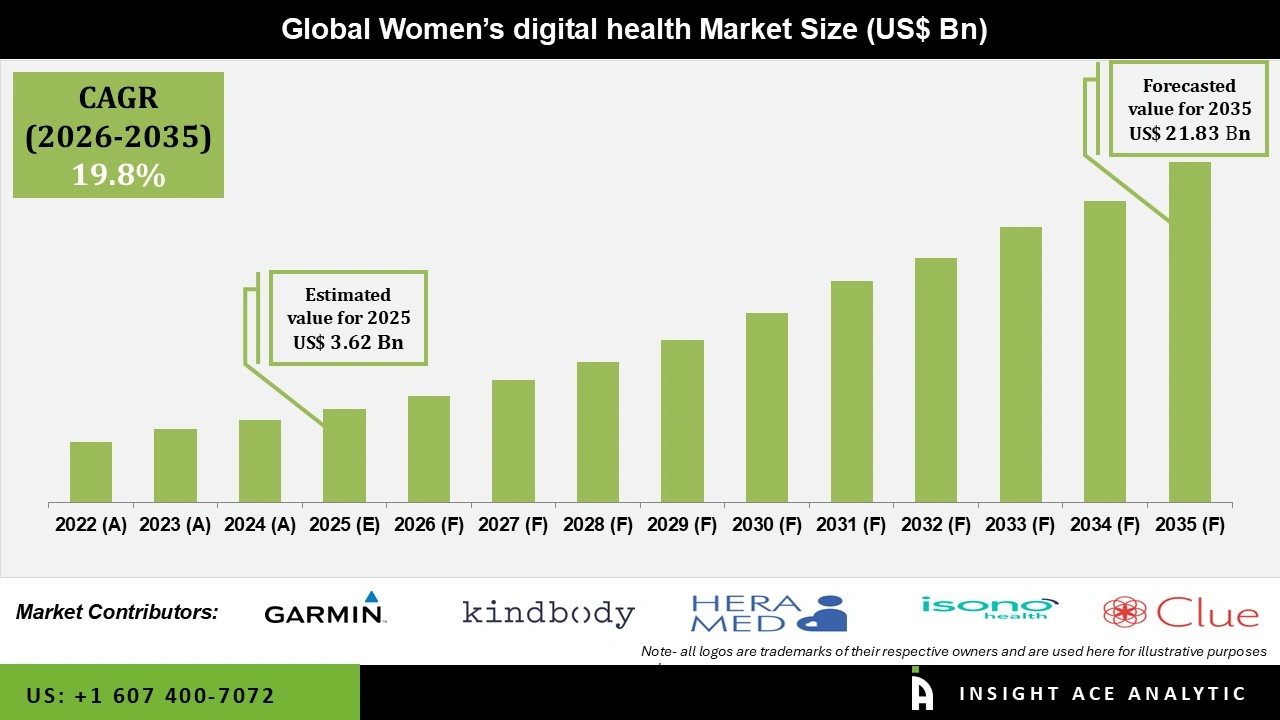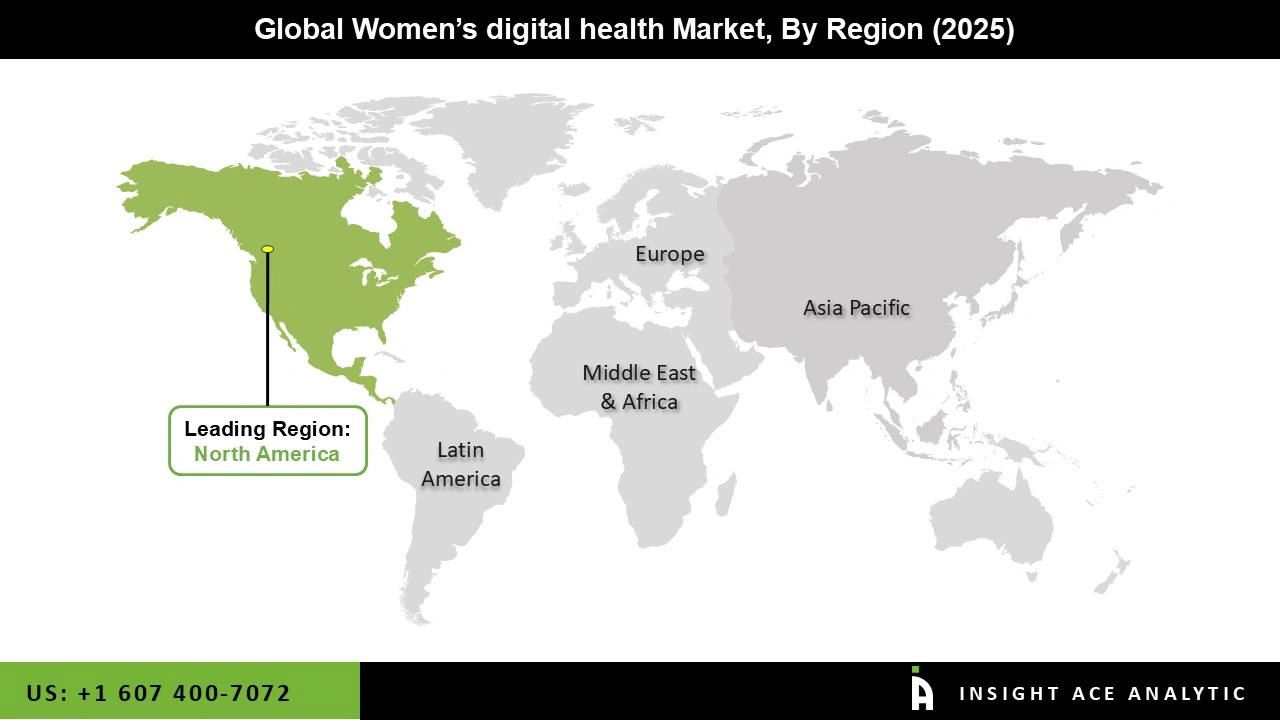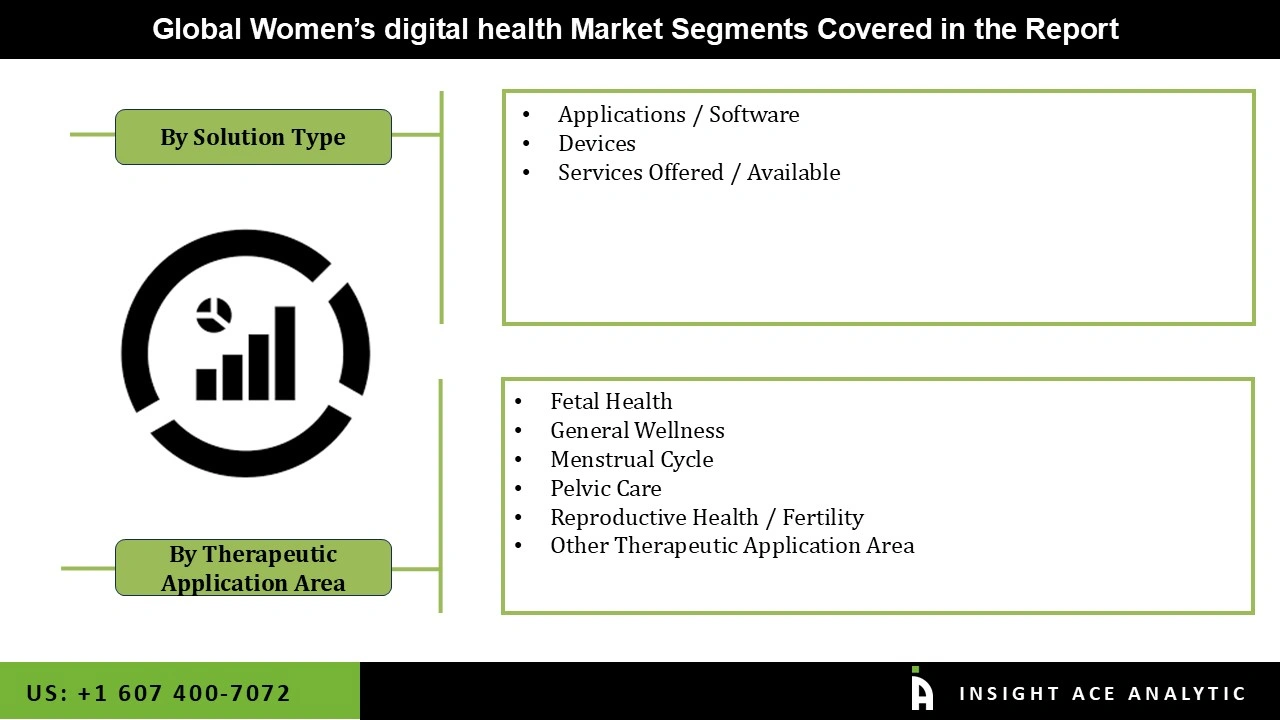Global Women’s Digital Health Market Size is valued at USD 3.62 Billion in 2025 and is predicted to reach USD 21.83 Billion by the year 2035 at a 19.80% CAGR during the forecast period for 2026 to 2035.
Women's Digital Health Market Size, Share & Trends Analysis Report By Solution Types (Applications/Software, Devices, Services Offered/Available), By Therapeutic Application Area, Region And Segment Forecasts, 2026 to 2035.

Women’s digital health market is projected to witness stellar growth across the forecast period owing to the rising adoption of digital solutions in the healthcare industry. Especially Women’s digital health market is anticipated to exhibit highly lucrative opportunities for 2022 – 2031. Focus on women’s health has substantially increased over the past few years owing to raising awareness of female health and hygiene. A paradigm shift in the social stigma surrounding severe women’s health issues has also favoured Women’s digital health market potential and is continuing to do so through 2031. Increasing investments in research and development of new digital health products for women are also expected to favour Women’s digital health market growth throughout the forecast period.
The COVID-19 pandemic decreased deployment and demand for Women’s digital health solutions owing to multiple restrictions in place to curb the spread of coronavirus infections worldwide. However, the Women’s digital health market is making a strong comeback in the post-pandemic era as the focus on health comes back to normal and the world returns to pre-pandemic levels.
The women’s digital health market is segmented on the basis of solution types and Therapeutic Application areas. By product, the market is segmented into single-ended brushes and double-ended brushes. By Therapeutic Application Area, the market is segmented into Fetal Health, General Wellness, menstrual Cycle, pelvic Care, Reproductive Health / Fertility, and Other Therapeutic Application areas.
Rising penetration of smartphones and other smart devices is expected to drive demand for digital health applications that are widely used in these devices. The application and software segment is anticipated to rise at the fastest CAGR of all other segments owing to increasing demand for new applications amid the increasing popularity of digital health among women and other individuals.
Menstrual cycle tracking apps have gained massive popularity over the past few years, and this trend is expected to drive demand for more menstrual cycle apps and devices over the coming years. Increasing menstrual health awareness among the women population and increasing disposable income of women are expected to drive demand in the menstrual cycle segment through 2031.
The North America Women’s digital health market is expected to continue its dominant outlook over the forecast period. The region is anticipated to see high growth opportunities owing to rapid technological proliferation and the presence of developed digital health infrastructure. The rising median age of the population is also expected to play a crucial role in Women’s digital health market development across the forecast period.

The most major markets in this area are projected to be the United States and Canada throughout the next years. The rising use of contraception and increasing awareness about menstrual health are also factors that drive demand in this region.
| Report Attribute | Specifications |
| Market Size Value In 2025 | USD 3.62 Billion |
| Revenue Forecast In 2035 | USD 21.83 Billion |
| Growth Rate CAGR | CAGR of 19.80% from 2026 to 2035 |
| Quantitative Units | Representation of revenue in US$ Million and CAGR from 2026 to 2035 |
| Historic Year | 2022 to 2025 |
| Forecast Year | 2026-2035 |
| Report Coverage | The forecast of revenue, the position of the company, the competitive market structure, growth prospects, and trends |
| Segments Covered | By Solution Types, By Therapeutic Application Area |
| Regional Scope | North America; Europe; Asia Pacific; Latin America; Middle East & Africa |
| Country Scope | U.S.; Canada; U.K.; Germany; China; India; Japan; Brazil; Mexico; The UK; France; Italy; Spain; South Korea; South East Asia |
| Competitive Landscape | Garmin, Kindbody, HeraMED Ltd, iSono Health, Inc, Clue by Biowink GmbH, Chiaro Technology Ltd. (Elvie), Natural Cycles USA Corp, Ava AG, NURX, Inc., Illumigyn, Athena Feminine Technologies, Inc., MobileODT Ltd., Lisa Health, Lucina Health (Unified Women's Healthcare), LetsGetChecked, Ro, Willow Innovations, Flo Health, Hubble Connected, Nannocare Inc., iPulse Medical Ltd., Loon Lab Inc., Dame, Biowink GmbH, Flo Health, Inc., Ovia Health, Glow, Inc, Cycles, Conceivable Inc, Ava Science, Inc, Tmpdrop LLC, BellBeat, Valley Electronics AG, Mira Kindara, YONO LABS, FairHeaven Health, Fertility Focus Limited, and Gals Bio Ltd |
| Customization Scope | Free customization report with the procurement of the report, Modifications to the regional and segment scope. Particular Geographic competitive landscape. |
| Pricing and Available Payment Methods | Explore pricing alternatives that are customized to your particular study requirements. |

This study employed a multi-step, mixed-method research approach that integrates:
This approach ensures a balanced and validated understanding of both macro- and micro-level market factors influencing the market.
Secondary research for this study involved the collection, review, and analysis of publicly available and paid data sources to build the initial fact base, understand historical market behaviour, identify data gaps, and refine the hypotheses for primary research.
Secondary data for the market study was gathered from multiple credible sources, including:
These sources were used to compile historical data, market volumes/prices, industry trends, technological developments, and competitive insights.

Primary research was conducted to validate secondary data, understand real-time market dynamics, capture price points and adoption trends, and verify the assumptions used in the market modelling.
Primary interviews for this study involved:
Interviews were conducted via:
Primary insights were incorporated into demand modelling, pricing analysis, technology evaluation, and market share estimation.
All collected data were processed and normalized to ensure consistency and comparability across regions and time frames.
The data validation process included:
This ensured that the dataset used for modelling was clean, robust, and reliable.
The bottom-up approach involved aggregating segment-level data, such as:
This method was primarily used when detailed micro-level market data were available.

The top-down approach used macro-level indicators:
This approach was used for segments where granular data were limited or inconsistent.
To ensure accuracy, a triangulated hybrid model was used. This included:
This multi-angle validation yielded the final market size.
Market forecasts were developed using a combination of time-series modelling, adoption curve analysis, and driver-based forecasting tools.
Given inherent uncertainties, three scenarios were constructed:
Sensitivity testing was conducted on key variables, including pricing, demand elasticity, and regional adoption.